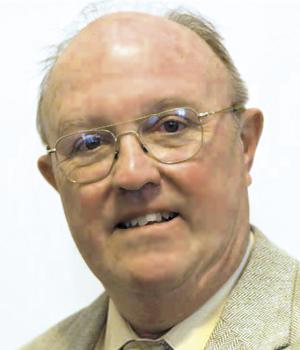Anyone who thinks Gov. John Carney is the most powerful official in Delaware state government is quite wrong.
No, the most powerful man in state government clearly is our very own Pete Schwartzkopf of Rehoboth Beach. By virtue of his two-thirds Democratic majority, he rules the state House of Representatives with an iron hand. He makes deals in the middle of the night, and the governor has to go along.
It should go without saying that there is plenty of blame to go around for the recent near-shutdown of state government. Democrats blame Republicans, as Carney and Schwartzkopf vehemently did the last day of the regular session. And, of course, Republicans blame Democrats.
Schwartzkopf is right about one thing. This year's budget compromise, if you can even call it that, doesn't solve the long-term problem. There may be relatively little objection to raising alcohol, tobacco and real estate taxes. The first two are "sin" taxes and always convenient targets for more money. Particularly in Sussex County, real estate taxes are often paid by people from out of state. They don't vote in the 14th House District.
Elected officials will sometimes acknowledge, though often with the wave of a hand, that there is a fundamental budget disconnect in Delaware and has been for quite a few years now. It is the disagreement over whether Delaware has a revenue problem or a spending problem.
Gov. Carney wants more revenue. That is why he proposed to raise the individual income tax, creating some new brackets and providing a higher percentage in the upper bracket. The better to tax the rich, in other words.
Republicans, on the other hand, want to cut spending. As Senate Minority Leader Gary Simpson, R-Milford, put it, "Can't the Democrats find even one place to cut spending?"
Apparently not. Other than these:
• Cut school spending requiring teachers to be laid off. No administrators, though.
• Eliminating grants-in-aid so fire companies and paramedics have less money.
• Eliminating itemized deductions on the income tax so churches and other nonprofits see their contributions shrink.
All great ideas, right?
So which should we seek? Should we seek to elect two more Democrats to the Senate? Or should we buckle down and begin to define what is truly a "core" responsibility in state government and then what "nice-to-have" things we could eliminate? Identifying core values shouldn't be that difficult.
Depending on how you define "core," of course. Here are a few ideas about what is core:
• Public safety. State police, prisons and courts are core responsibilities of any state government. This includes the National Guard, which is mostly financed by the federal government.
• Highways and bridges.
• Education. States differ on this. In Delaware, a far larger percentage of public school expense is financed at the state level than many states. We also have far lower property taxes.
• Corporations. All states do this, but it is core in Delaware.
• Environmental control. If you don't want the feds in your knickers, you do this at the state level.
• Health and welfare. The unfortunate among us need some help with this. Usually the question is how much?
If I were Pete Schwartzkopf, I would convene the Joint Finance Committee after Labor Day and mandate they spend the fall figuring out what is a core state function and what is nice to have. Medicaid is a core function, but not for some of the thousands now enrolled.
Prisons are a core function. And if fire departments and paramedics are a core function, then why not give them a line item in the budget and phase out of the grant-in-aid business.
I once knew a man named Tom Runyon. My father knew him better and had befriended him. Some years earlier, during the Great Depression, when jobs were nearly nonexistent, Runyon decided that his family needed more revenue. So Runyon and his buddies decided to take action and increase their family revenue.
The solution to their problem was to rob banks. This went fairly well for a while. It avoided the need to cut spending.
No Democratic legislator faces the penalty imposed on Tom Runyon. By the time I knew him, Tom was a model prisoner. He was completely rehabilitated and should have been a good candidate for parole.
He died in prison because bank robbery had been made a federal crime in addition to state.
Legislators face no prison time, certainly not a life sentence. But the way Democrats react to the idea of cutting spending suggests they think the penalty for this is purgatory, or worse.
Reid Beveridge has covered politics in Texas, Iowa, Wisconsin, Delaware and Washington, D.C. He is now retired at Broadkill Beach. Beveridgere@prodigy.net.























































